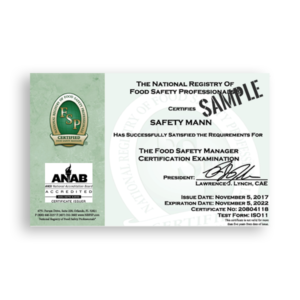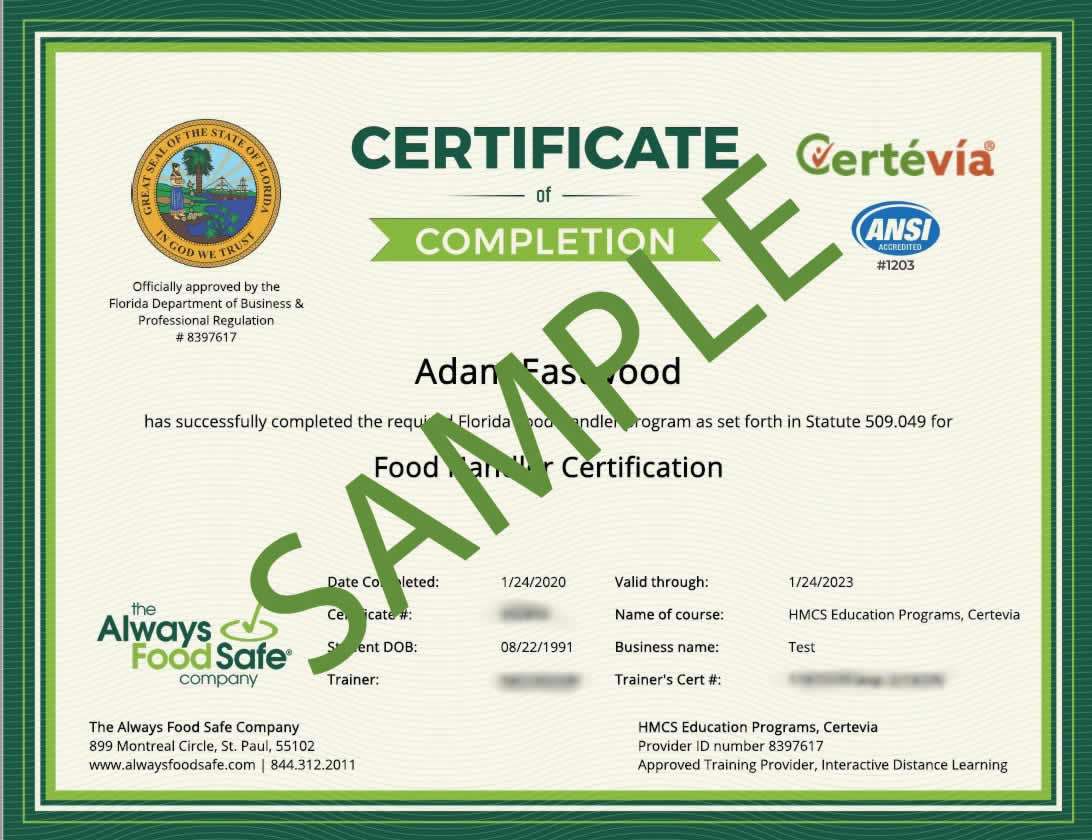What to Expect in the ServSafe Food Manager Certification Exam
What to Expect in the ServSafe Food Manager Certification Exam
Blog Article
Certified Food Supervisor: The Key to Safe and Compliant Workflow
The function of a Qualified Food Supervisor (CFM) is progressively identified as necessary in keeping certified and risk-free procedures within the food service industry. By implementing rigorous food handling and prep work criteria, CFMs play a critical function in mitigating risks connected with foodborne health problems and making certain adherence to governing needs. The influence of their competence extends beyond conformity; it fosters an environment of liability and operational performance. Understanding the full extent of their contributions increases inquiries concerning the more comprehensive implications for businesses and consumer rely on food safety and security methods.
Function of a Licensed Food Manager
The function of a Licensed Food Supervisor is critical in ensuring food safety and compliance within food service facilities. These professionals are responsible for supervising all facets of food handling, storage space, and preparation, guaranteeing that centers stick to wellness laws and industry standards. Their training outfits them with the knowledge to recognize potential hazards, implement correct food security techniques, and keep hygiene methods.
Certified Food Supervisors play a crucial duty in training and monitoring cooking area personnel, instilling a culture of safety and security and conformity throughout the facility. They conduct normal examinations to recognize locations that require improvement and ensure that corrective activities are implemented swiftly - Certified Food Manager Certification. Additionally, they are tasked with creating and enforcing standard procedure (SOPs) pertaining to food safety, which serve as an overview for workers
Their experience encompasses checking food temperatures, preventing cross-contamination, and handling allergen controls, every one of which are necessary to protecting public wellness. Qualified Food Supervisors are typically the key point of get in touch with during health evaluations, representing their establishments and attending to any compliance concerns increased by wellness authorities. Ultimately, their dedication to food security is vital for preserving customer count on and guarding the credibility of food service organizations.
Significance of Food Safety And Security
Food safety and security is constantly a leading priority in the food service sector, as it straight impacts public health and consumer self-confidence. Guaranteeing that food is handled, prepared, and kept securely aids to stop foodborne diseases, which can cause extreme health and wellness difficulties and also casualties. The economic consequences of foodborne episodes can be shocking, leading to pricey recalls, legal activities, and significant damages to a service's credibility.
Furthermore, food safety and security methods promote a culture of accountability and professionalism within food facilities. When staff members are educated in appropriate food dealing with strategies, they are most likely to comply with safety and security protocols, which decreases the danger of contamination. This not just protects customers yet likewise boosts operational effectiveness and conformity with local health and wellness policies.
Consumer recognition pertaining to food security has enhanced considerably, resulting in increased assumptions for transparency and quality in food solution. Facilities that focus on food safety and security are more probable to get customer trust fund and commitment, ultimately contributing to their lasting success. For that reason, purchasing robust food safety and security measures is not simply a regulatory responsibility; it is a basic business technique that benefits both consumers and food solution drivers alike.
Training and Accreditation Process
Understanding the training and qualification process for food managers is important for maintaining high requirements of food security within any type of facility. The procedure generally begins with thorough training programs that cover vital topics such as foodborne health problems, proper food taking care of techniques, and cleanliness practices. ServSafe Food Manager Certification. These programs can be supplied through numerous layouts, including online courses, in-person classes, or workshops, and are created to gear up food managers with the understanding required to prevent food safety and security dangers
Upon completion of the training, prospects must pass a certification test, which assesses their understanding of food safety and security principles and guidelines. The examination is usually carried out by certified organizations, making certain that the certification is acknowledged read the full info here and respected within the market.
Once accredited, food managers are called for to remain present with continuous education and training to maintain their qualifications. This might consist of participating in refresher programs or taking part in workshops that resolve brand-new food safety and security methods and guidelines. In general, a robust training and accreditation process not only enhances the skills of food supervisors yet likewise adds to the overall security and conformity of food operations in any kind of facility.
Compliance With Laws
Compliance with laws is an important facet of a food manager's responsibilities, as it makes certain that establishments stick to local, state, and government food security requirements. These laws are created to minimize risks connected with foodborne ailments and promote safe food taking care of methods. A qualified food manager (CFM) plays an essential function in translating and implementing these criteria within their procedures.

CFMs must likewise create and apply surveillance systems to consistently analyze compliance with food safety and security practices. This might entail regular evaluations, record keeping, and training sessions for staff to strengthen secure food handling protocols (Certified Food Manager Certification). Additionally, in the occasion of a governing evaluation, a CFM's readiness can considerably affect the result, as they will certainly be in charge of demonstrating adherence to all pertinent standards. Ultimately, efficient conformity management cultivates a society of safety and security and responsibility within food service procedures.

Advantages of Working With CFMs
Working with certified food supervisors (CFMs) uses considerable advantages for food service establishments seeking to boost their functional efficiency and safety and security standards. CFMs possess specialized understanding of food security guidelines, hygiene techniques, and threat management, ensuring compliance with local and federal laws. This expertise helps lower the possibility of violations that could lead to momentary closures or expensive penalties.
Moreover, CFMs play a vital role in training personnel, fostering a society of food safety and security within the facility. They carry out standard procedures, display food managing practices, and carry out routine audits, considerably decreasing the risk of foodborne illnesses. This not just secures customers but also boosts the facility's credibility.
Furthermore, hiring CFMs can cause improved functional efficiency. Their training makes it possible for staff to function better, reducing waste and making the most of performance. Establishments with licensed food supervisors typically experience greater client satisfaction, as well-trained staff members are better outfitted to ensure high quality he said solution and food safety.

Eventually, purchasing a qualified food supervisor is a financial investment in the long-term success and sustainability of a food service operation, producing a more secure setting for both clients and workers.
Verdict
In verdict, the duty of a Certified Food Manager is important in preserving risk-free and certified food service operations. With efficient oversight of food managing methods, continuous staff training, and adherence to regulative requirements, CFMs play a Your Domain Name critical duty in mitigating foodborne illness threats. The financial investment in qualified monitoring not just boosts functional effectiveness but also fosters a society of liability, eventually benefiting both the establishment and its clients while advertising public health and wellness and security.
The role of a Certified Food Supervisor is vital in making sure food security and compliance within food solution facilities.Recognizing the training and certification procedure for food managers is essential for maintaining high criteria of food security within any facility. In general, a robust training and accreditation process not just improves the abilities of food supervisors but additionally contributes to the total safety and compliance of food operations in any type of establishment.
Hiring certified food supervisors (CFMs) provides considerable advantages for food solution establishments looking for to enhance their functional efficiency and safety and security requirements. Facilities with certified food supervisors typically experience greater client complete satisfaction, as trained workers are better furnished to ensure high quality solution and food security.
Report this page